14 Best Energy-Efficiency Carbon Offsets (Complete 2024 List)
Impactful Ninja is reader-supported. When you buy through links on our site, we may earn an affiliate commission.
Learn more
Learn more
.
Hey fellow impactful ninja ? You may have noticed that Impactful Ninja is all about providing helpful information to make a positive impact on the world and society. And that we love to link back to where we found all the information for each of our posts. Most of these links are informational-based for you to check out their primary sources with one click. But some of these links are so-called "affiliate links" to products that we recommend. First and foremost, because we believe that they add value to you. For example, when we wrote a post about the environmental impact of long showers, we came across an EPA recommendation to use WaterSense showerheads. So we linked to where you can find them. Or, for many of our posts, we also link to our favorite books on that topic so that you can get a much more holistic overview than one single blog post could provide. And when there is an affiliate program for these products, we sign up for it. For example, as Amazon Associates, we earn from qualifying purchases. First, and most importantly, we still only recommend products that we believe add value for you. When you buy something through one of our affiliate links, we may earn a small commission - but at no additional costs to you. And when you buy something through a link that is not an affiliate link, we won’t receive any commission but we’ll still be happy to have helped you. When we find products that we believe add value to you and the seller has an affiliate program, we sign up for it. When you buy something through one of our affiliate links, we may earn a small commission (at no extra costs to you). And at this point in time, all money is reinvested in sharing the most helpful content with you. This includes all operating costs for running this site and the content creation itself. You may have noticed by the way Impactful Ninja is operated that money is not the driving factor behind it. It is a passion project of mine and I love to share helpful information with you to make a positive impact on the world and society. However, it's a project in that I invest a lot of time and also quite some money. Eventually, my dream is to one day turn this passion project into my full-time job and provide even more helpful information. But that's still a long time to go. Stay impactful,Affiliate Disclosure
Why do we add these product links?
What do these affiliate links mean for you?
What do these affiliate links mean for us?
What does this mean for me personally?
![]()
Experts have stated that the concept of energy efficiency, upgrading to systems that use less energy than traditional systems to perform the same task, could prove critical to mitigating climate change and keeping global temperature rise below 2 degrees Celsius. So, we had to ask: what are the best energy-efficiency carbon offsets?
The best energy-efficiency carbon offsets are offered by Carbonfund, DelAgua, South Pole, and Ecologi which all support various energy-efficiency projects across the globe. In addition, myclimate and Clear offer various offsets for individuals and businesses that support clean cookstoves projects.
Keep reading to learn more about the best carbon offsets for energy efficiency, how these carbon offset projects work, what their respective offsetting costs are, and what your best way would be to offset your carbon emissions. At the end of the article, we’ll also share with you what the biggest carbon offsetting limitations are and why reducing your carbon footprint is more effective than offsetting it.
Here’s What All the Best Energy-Efficiency Carbon Offsets Have in Common
Carbon offsets are reductions in carbon emissions that are used to compensate for carbon emissions occurring elsewhere. They are measured in tons of CO2 equivalents and are bought and sold through international brokers, online retailers, and trading platforms on what is known as the global carbon offset market.
“Carbon Offset: a way for a company or person to reduce the level of carbon dioxide for which they are responsible by paying money to a company that works to reduce the total amount produced in the world, for example by reforestation”
Oxford Dictionary
Energy efficiency describes products or systems that use less energy than conventional systems to perform the same task. Energy-efficiency carbon offsets are a specific type of carbon offset that upgrade conventional systems into energy-efficient ones.
“Energy efficiency: the use of less energy to perform the same task or produce the same result.”
U.S. Department of Energy
Examples of energy-efficiency projects include:
- Energy-efficient solutions for disadvantaged households
- Energy-efficient buildings use less energy to heat and cool
- Energy-efficient facilities use less energy to manufacture goods
- Energy-efficient transportation reduces fuel usage
Some of the most common energy-efficiency projects involve energy-efficient cookstoves, water filtration programs, and co-generation facilities.
In general, energy-efficiency projects save money, increase the resiliency of our power grid, positively impact public health, and mitigate climate change.
These Are the 14 Best Energy-Efficiency Carbon Offsets in 2024
Below are our favorite energy-efficiency carbon offsets (you can click on their link to directly jump to their section in this article):
| Energy-Efficiency Carbon Offsets | Quick Facts |
| Carbonfund | About: Purchases support energy-efficiency carbon offset projects including efficient cookstoves, water filtration, waste co-generation, and tailpipe emissions reduction. Costs: $16.25-$17.16 per 1,000kg of CO2 for individuals, $390-$1,560 per year for small businesses, determined after initial contact for large businesses |
| DelAgua | About: Purchases support the Rwandan clean cookstoves energy-efficiency carbon offset project. Costs: Costs are determined after initial contact |
| South Pole | About: Purchases support energy-efficiency carbon offset projects including clean cookstoves in China, Mali, and Rwanda. Costs: Costs are determined after initial contact |
| Ecologi | About: Purchases support energy-efficiency carbon offset projects including efficient cookstoves in Kenya, Tanzania, Zambia, Ghana, and Honduras. Costs: $6.04 per 1,000 kg of CO2 offset |
| myclimate | About: Purchases support energy-efficiency carbon offset projects including efficient cookstoves in Kenya, Bolivia, Peru, and Madagascar. Costs: $ 23-$30 per 1,000kg of CO2 |
| GoClimate | About: Purchases support energy-efficiency carbon offset projects including the clean-burning stoves in Kenya project. Costs: $16.99 per 1,000kg of CO2 for monthly subscriptions, B2B determined after initial contact. |
| CarbonClick | About: Purchases support energy-efficiency carbon offset projects including the Improved Cooking Practices in Nigeria project. Costs: $20 per 1,000kg of CO2 |
| Clear | About: Purchases support energy-efficiency carbon offset projects including improved cookstoves in Kenya and Malawi. Costs: 18.99-$25 per 1,000kg of CO2 |
| Wren | About: Purchases support the clean cooking fuel for refugees project in Uganda, which converts farming waste into charcoal bricks to be used as cooking fuel. Costs: $19.80 per 1,000 kg of CO2 offset |
| Native Energy | About: Purchases support energy-efficiency carbon offset projects including the Madagascar Solar and Efficient Cookstoves project. Costs: $15.50 per 1,000 kg of CO2 |
| Cool Effect | About: Purchases support energy-efficiency carbon offset projects including the Breath of Fresh Air clean cookstoves project in Honduras, which builds cookstoves in rural communities. Costs: $8.79 – $21.97 per 1,000 kg of CO2 |
| Zero Smart | About: Purchases support energy-efficiency carbon offset projects including the efficient cookstoves project in Eritrea, which empowers local women to build, install and maintain fuel-efficient cookstoves. Costs: $5.37 – $5.97 per 1,000 kg of CO2 |
| 3Degrees | About: Purchases support energy-efficiency carbon offset projects including the BioLite Improved Stove Programme in Uganda, which provides communities with ultra-clean burning fan-assisted wood stoves that reduce air pollution. Costs: Costs are determined after initial contact |
| Co2nsensus | About: Purchases support energy-efficiency carbon offset projects including efficient cookstoves in Kenya, and geothermal and solar energy in Turkey. Costs: Costs are determined after initial contact |
Carbonfund: Go Carbon Neutral
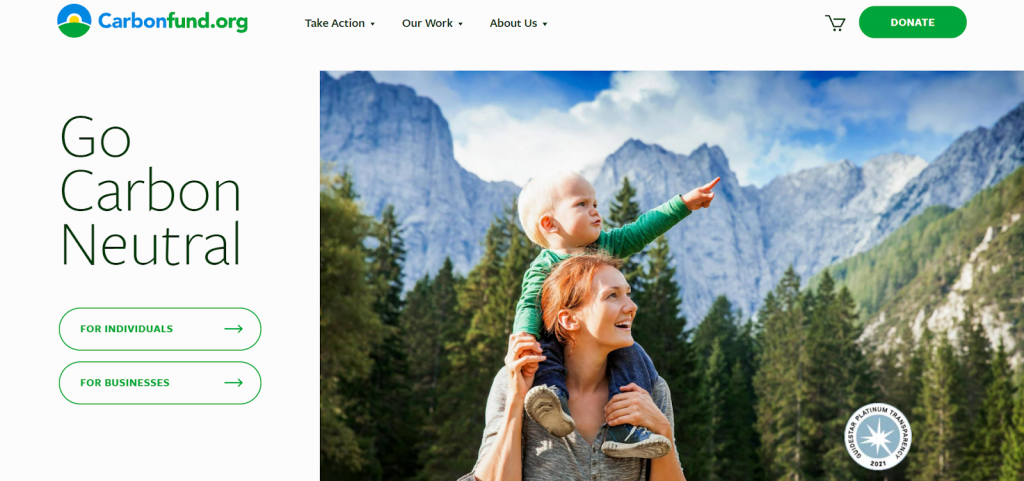
Carbonfund was founded in 2003 by Eric Carlson to make it easy for any individual, business, or organization to reduce and offset their climate impact. Today, they have been incorporated into ClimeCo and provide verified energy efficiency, renewable energy, and forestry carbon offsets for individuals and businesses.
“Reduce what you can, offset what you can’t.”
Carbonfund
Carbon offset overview: Carbonfund supports four energy-efficiency projects:
- Kenya Burn Stoves Project: provides Kenyan communities with efficient cookstoves that reduce air pollution and reduce deforestation.
- Aqua Clara Water Filtration Programme: provides Kenyan communities with bio-sand water purifiers that reduce the use of traditional firewood as fuel.
- South Korea Waste Energy Co-Generation Project: uses surplus waste gasses to generate electricity and steam, reducing the need to import fossil fuels.
- Truck Stop Electrification Project: reduces tailpipe emissions from freight trucks that transport consumer goods across the US.
Carbon offset effectiveness: The Burn Stoves Project and Water Filtration Programme are certified by the Gold Standard. The Waste Energy Co-Generation Project is certified by the Verified Carbon Standard. And the Truck Stop Electrification Project is certified by the American Carbon Registry.
Carbon offset costs: Individual carbon offsets range from $16.25-$17.16 per 1,000kg of CO2, small business carbon offsets range from $390-$1,560 per year (dependent on the number of employees), and large business carbon offset costs are evaluated after personal contact.
How to get your carbon offsets: You can visit their website to purchase your individual or business energy-efficiency carbon offsets.
DelAgua: Experts in Carbon Development Projects
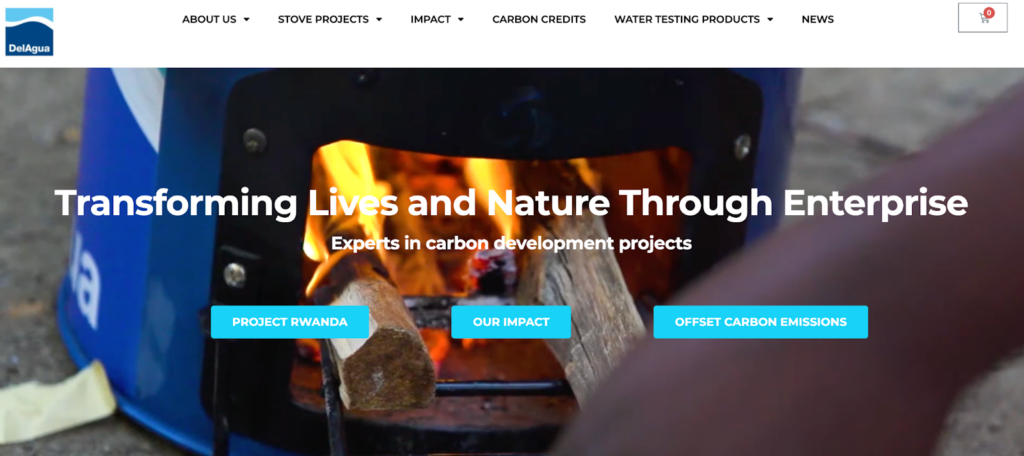
DelAgua was founded in 1985 as a water testing company aimed at providing clean water to rural African communities. Today, their water testing kit is used in 150+ countries and they offer carbon credits from a pioneer Rwandan clean cookstoves project.
“Transforming lives and nature through enterprise”
DelAgua
Carbon offset overview: DelAgua launched the Rwandan clean cookstoves project in partnership with the Government of Rwanda in 2013 to transform the lives and environment of rural African communities. To date, the project has provided over 6 million Rwandans with 1.3 million stoves, free of charge. The stoves use small twigs and branches, which people can collect without cutting down trees, thereby reducing deforestation and using 71% less wood than a traditional fire. It is one of the largest programs of its kind which has helped pull families from poverty and avoid CO2 emissions.
Carbon offset effectiveness: Del Agua’s carbon offset projects are certified by the Verified Carbon Standard. They are also aligned with the Paris Agreement and adhere to multiple UN Sustainable Development Goals.
Carbon offset costs: Costs are determined after initial contact.
How to get your carbon offsets: You can visit DelAgua’s website and contact a representative to get your energy-efficiency carbon offsets.
South Pole: Providing the Tools to Achieve a Low-Carbon Reality
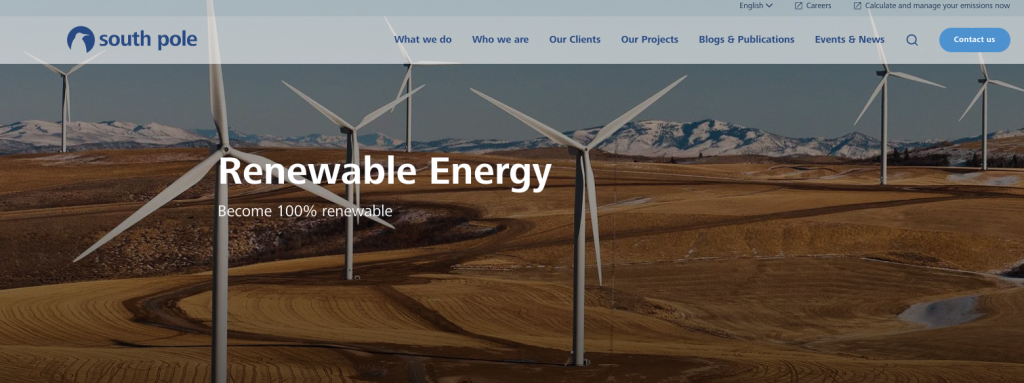
South Pole was founded in 2006 by 5 graduate students from the Swiss Federal Institute of Technology (ETH) as a platform to confront climate change. Today, they offer a wide variety of climate solutions including carbon offsets, environmental credits, and renewable energy credits (RECs).
“From ambition to action”
South Pole
Carbon offset overview: South Pole has a portfolio of over 700 verified carbon offset projects involving energy efficiency, biodiversity, clean water, and renewable energy. Examples of energy-efficiency projects include WWF Nature Clean Cookstoves in China, Bamako Clean Cookstoves in Mali, and Efficient Cookstoves in Rwanda.
Carbon offset effectiveness: South Pole’s carbon offset projects are certified by either the Verified Carbon Standard, Gold Standard, American Carbon Registry, or Climate Action Reserve. They are also aligned with the Paris Agreement and the United Nations Sustainable Development Goals.
Carbon offset costs: Costs are determined after initial contact.
How to get your carbon offsets: You can visit South Pole’s website and contact a representative to get your energy-efficiency carbon offsets.
Ecologi: A Global Carbon Offset Portfolio
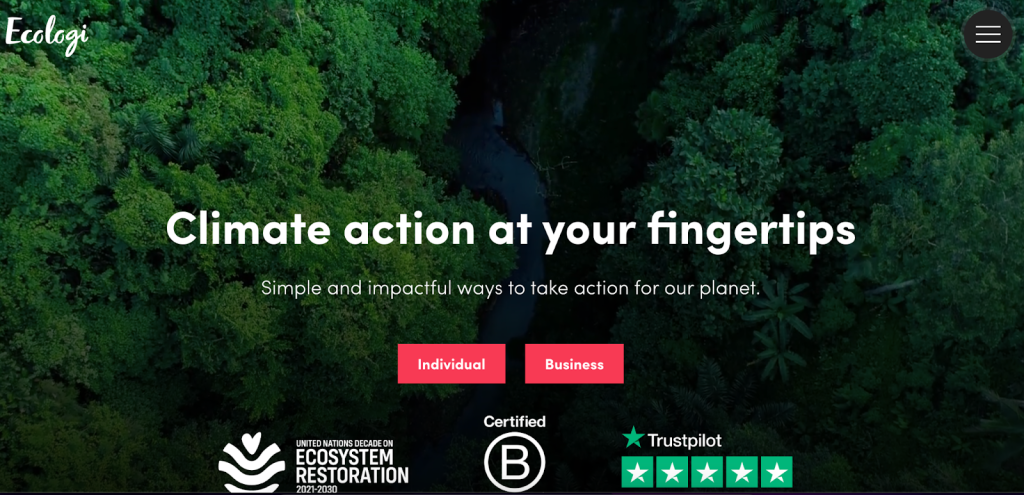
Ecologi was founded in 2019 by Elliot Coad, Lucy Jack, and Alex Price as an answer to the question “What if I put the money from my morning coffee into climate action”? Today, they have funded over 57 million trees, avoided over 2 million tons of carbon, and continue to enable everyday people to tackle the current climate crisis via reforestation and carbon offsetting projects.
“For less than the cost of a cup of coffee per week you can become climate positive.”
Ecologi
Project overview: Ecologi supports energy efficiency, reforestation, methane capture, blue carbon, and renewable energy projects globally. Examples of energy-efficiency projects include: distributing cleaner cookstoves in Kenya, high-efficiency cookstoves in Tanzania, cleaner cookstoves in Zambia and Ghana, and fuel-efficient cookstoves in Honduras.
Carbon offset effectiveness: Ecologi’s carbon offsetting projects are certified by either the Gold Standard or the Verified Carbon Standard. And they also have an interactive google sheet where you can check when, where, and how many trees are planted through their platform.
Carbon offset costs: It costs approximately $6.04 per 1,000 kg of CO2 offset. Ecologi has a personal offset plan where you choose how many trees get planted (12, 24, or 48) for a price ($10.50, $21, or $42 per month).
How to get your carbon offsets: You can visit Ecologi’s website to select your personal carbon offset plan and get your energy-efficiency carbon offsets.
myclimate: Shaping the Future
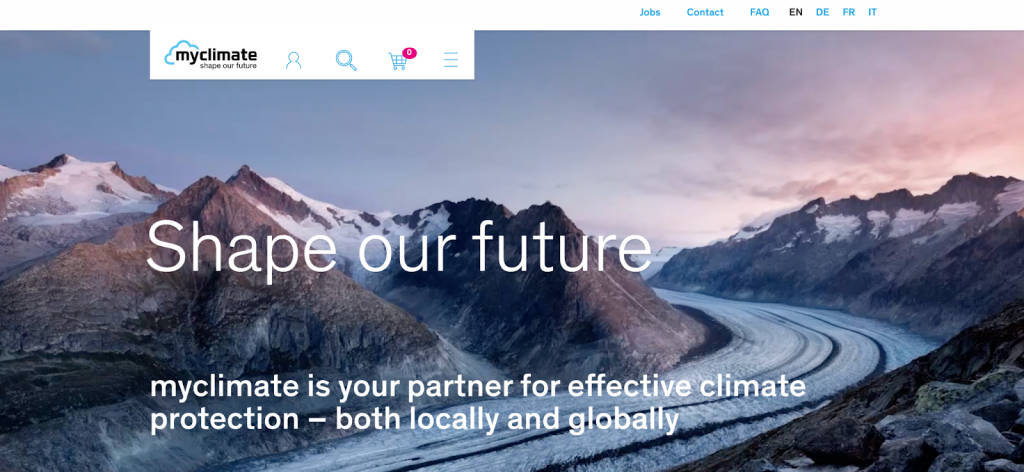
myclimate was founded in 2002 by Renat Heuberger, Thomas Camerata and Patrick Bürgi as an international climate organization with Swiss roots. Today, they have expanded to 45 countries and work with companies of all sizes, public administrations, non-profit organizations, and private individuals to provide high-quality carbon offset projects with quantifiable climate protection.
“myclimate is your partner for effective climate protection – locally and globally”
Myclimate
Carbon offset overview: myclimate provides carbon offsets, including energy-efficiency projects, for flights, cars, cruises, events, and your household. Examples of energy-efficiency projects include installing efficient cookstoves in Kenya, Bolivia, Peru, and Madagascar to replace wood-burning ones.
Carbon offset effectiveness: myclimate projects are certified according to either the Gold Standard, Verified Carbon Standard, or Plan Vivo and contribute to the UN’s Sustainable Development Goals.
Carbon offset costs: It costs approximately $30 per 1,000kg of CO2 offset for an individual carbon offset and $23 per 1,000kg of CO2 offset for a monthly, quarterly, or annual offset subscription.
How to get your carbon offsets: You can visit myclimate’s website to offset your emissions from flights, cars, cruises, events, or your household and get your energy-efficiency carbon offsets. You can also enroll in a subscription or donate to myclimate’s mission by either contributing a certain dollar amount or offsetting a certain number of kg of CO2.
Clear: Join the Climate Change Mission
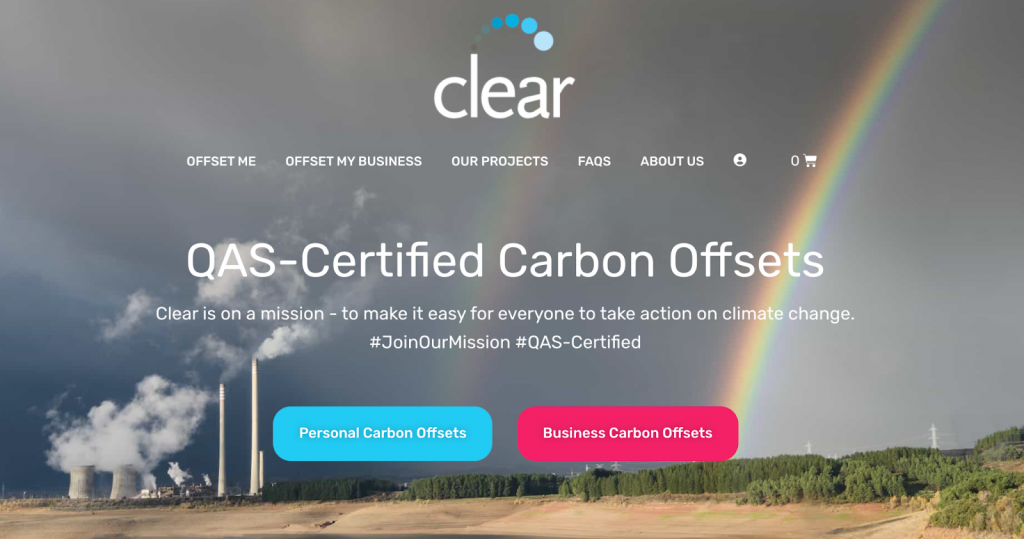
Clear was founded in 2005 by Bruce Elliott, Neil Chapman, and Ben Hedley to empower individuals and smaller companies to easily take environmental action now. Today, they provide individuals and businesses the opportunity to offset activities such as staying in hotels, commuting, public transport, maritime freight, and even skydiving and balloon flights.
“Will this carbon offset really cover the emissions I can’t avoid creating?
Clear
Clear is dedicated to living up to that promise.”
Carbon offset overview: Clear offers a wide variety of carbon offsets for individuals and businesses. Examples of energy-efficiency projects include improved cookstoves in Kenya and Malawi.
Carbon offset effectiveness: Clear carbon offsets are the first in the world to be independently certified against the Quality Assurance Standard (QAS), a comprehensive independent audit system for companies wanting to become carbon neutral through carbon reduction.
Carbon offset costs: It costs approximately $18.99–$25 per 1,000kg of CO2 offset. They also offer the option to make your purchase carbon-negative at 50%, 100%, or 200% which increases the overall cost accordingly.
How to get your carbon offsets: You visit Clear’s website to use their carbon offset calculator and get your energy-efficiency carbon offsets.
GoClimate: Personalized Carbon Footprint Subscriptions
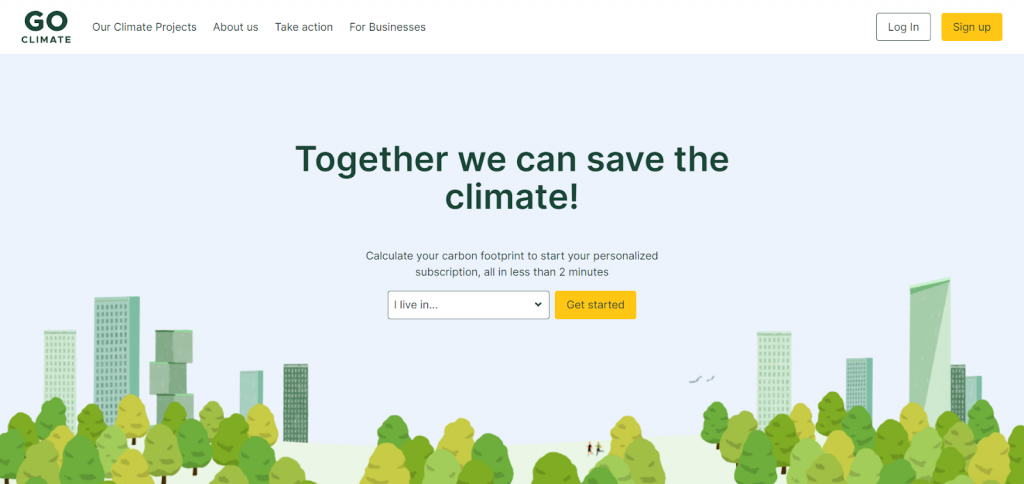
GoClimate was founded in 2017 by Kalle Nilvér and Cecilia Lindén with the goal of slowing climate change. Today, they offer a carbon offset subscription service for contributing to certified climate projects. Since their inception, they have helped avoid over 700,000 tonnes (800 thousand tons) of CO2.
“Together we can save the climate!”
GoClimate
Carbon offset overview: GoClimate offers monthly subscriptions, gift cards, and flight offsets. They rotate their projects but currently support the clean-burning stoves in Kenya project, which replaces open-fire stoves with energy-efficient ones. The project reduces fuel usage by 40% and creates jobs for women in the community. Previously, GoClimate has supported other renewable energy, cookstoves, clean water, landfill gas, and methane recovery projects globally.
Carbon offset effectiveness: GoClimate’s offset projects are third-party verified by the Gold Standard.
Carbon offset costs: It costs approximately $16.99 per 1,000kg of CO2 offset for a monthly subscription. Their business side is a B2B operation, so costs are determined after booking a meeting with a climate advisor.
How to get your carbon offsets: You can visit GoClimate’s website to use their carbon calculator or to book a meeting with a climate advisor. Their business calculator is currently only available for businesses located in Sweden or the United Kingdom, but you can contact GoClimate directly if you are located in a different country.
CarbonClick: Climate Action Made Simple
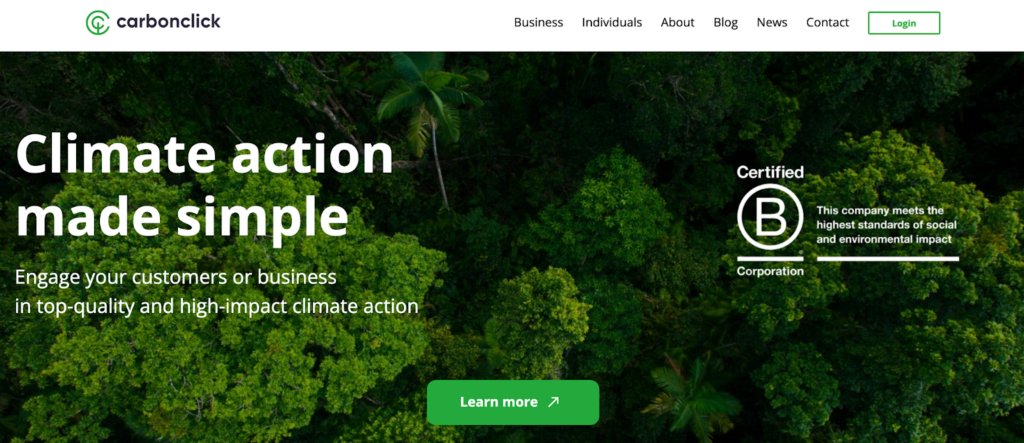
CarbonClick was founded in 2019 by Dave Rouse, Jan Czaplicki, Paul Brady, and Michelle Noordermeer as a way to make climate action simple and transparent for both customers and businesses through projects that support the planet. Today, they have offset over 600 million pounds of CO2 through various carbon offset projects.
“We exist to reverse climate change”
CarbonClick
Carbon offset overview: The offsets you purchase from CarbonClick are automatically sourced from a number of projects, depending on your geographical location. The energy-efficiency project they support is the Improved Cooking Practices in Nigeria project, which makes and distributes charcoal cookstoves to replace wood-burning ones. The project reduces indoor air pollution, demand for wood, and overall carbon emissions.
Carbon offset effectiveness: Their efficient cookstoves project is registered with the Gold Standard and adheres to multiple UN Sustainable Development Goals.
Carbon offset costs: CarbonClick offers 4 monthly subscriptions which offset carbon at a cost of approximately $20 per 1,000kg of CO2.
How to get your carbon offsets: You can visit their webpage to get your energy-efficiency carbon offsets.
Wren: Your All-In-One Climate Subscription
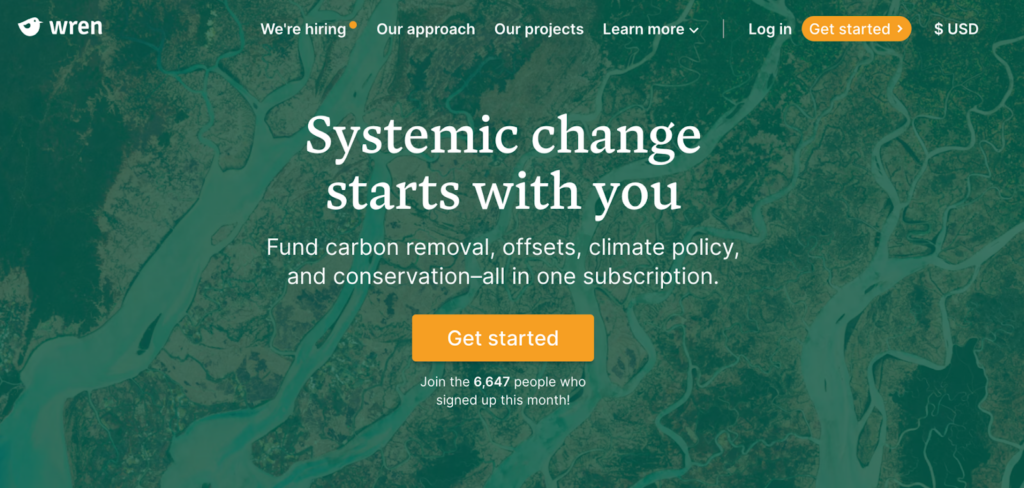
Wren was founded in 2019 by Landon Brand, Mimi Tran Zambetti, and Ben Stanfield as a climate-conscious company formulated to be your “on-ramp” to climate action. Today, they have offset over 160,000 tons of CO2 in four countries and are helping to reverse the climate crisis.
“Climate change is the largest crisis humanity has ever faced. But we can fix it.”
Wren
Carbon offset overview: Wren has a carbon footprint calculator that uses personalized information to calculate 3 different carbon offset subscriptions. An example of an energy-efficiency project is their clean cooking fuel for Refugees project in Uganda, which converts farming waste into charcoal bricks for cooking fuel.
Carbon offset effectiveness: Wren’s carbon offsets are permanent, additional, only counted once, and based on peer-reviewed science.
Carbon offset costs: It costs approximately $19.80 per 1,000kg of CO2 offset.
How to get your carbon offsets: You can visit Wren’s website to use their carbon calculator and get your energy-efficiency offsets.
Native Energy: Changing the World Through Climate Projects
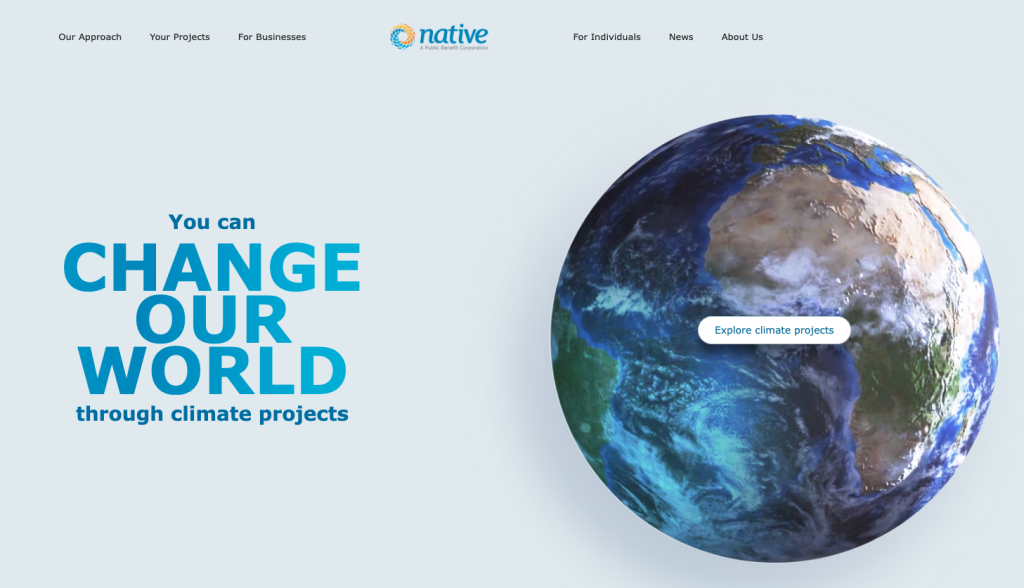
Native Energy was founded in 2000 by Jeff Bernicke as a platform for organizations to implement projects that reduce greenhouse gas emissions and combat climate change.
Today, they offer carbon offsets and renewable energy solutions that allow clients to invest and enable the development of new climate projects with direct business benefits.
“Envision your ideal climate solution. Let us build it.”
Native
Carbon offset overview: Native’s HelpBuildTM carbon offsets bridge the gap between the funding and building phases. You purchase offsets from the project in advance, so you, therefore, play a key role in funding its construction. Native supports the Madagascar Solar and Efficient Cookstoves project, which replaces open-fire cooking with solar and energy-efficient cookstoves.
Carbon offset effectiveness: Their efficient cookstoves project is verified according to the Gold Standard. All Native’s offsets are verified by the Verified Carbon Standard, Gold Standard, American Carbon Registry, Climate Action Reserve, Plan Vivo, or the Climate, Community & Biodiversity Alliance to help ensure transparency and quality in the creation, quantification, and verification of offset projects.
Carbon offset costs: It costs $15.50 per 1,000kg of CO2 offset.
How to get your carbon offsets: You can visit their website and contact a representative to get more information about and support their efficient cookstoves project.
Cool Effect: Giving Like the Planet Depends On It
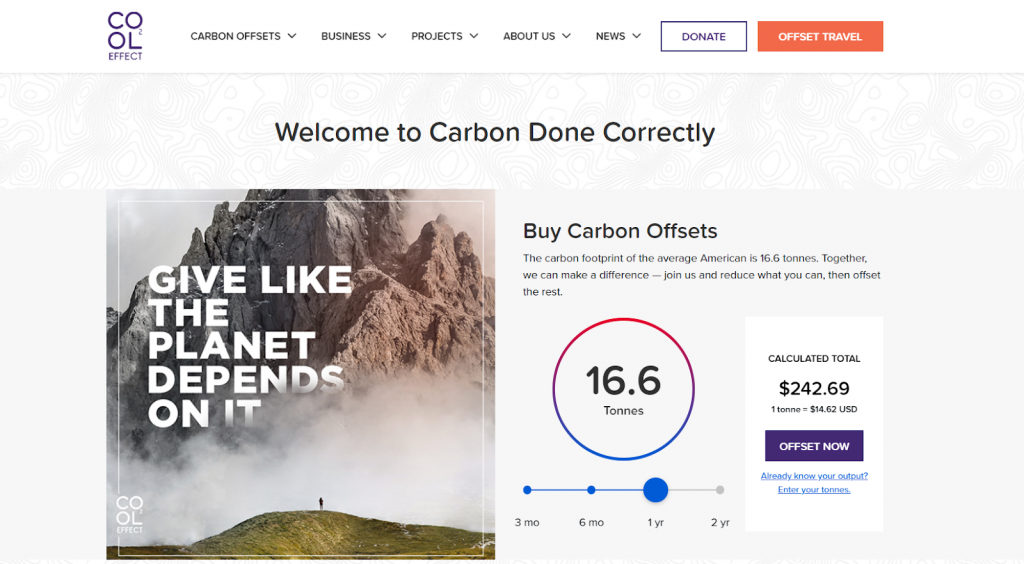
Cool Effect was founded in 1998 by Richard H. Lawrence, Jr. and Dee Lawrence as a small cookstove project in Honduras. Today, they have grown to represent a platform with 15+ global projects and a community of 500,000+ that aims to reduce carbon pollution globally.
“Carbon done correctly”
Cool Effect
Project overview: Cool Effect offers carbon offsets for travel and flights. An example of an energy-efficiency project is the Breath of Fresh Air clean cookstoves project in Honduras, which builds cookstoves in rural communities.
Carbon offset effectiveness: Cool Effect’s projects are 100% additional and are verified by either the Gold Standard, Verified Carbon Standard, or Climate Action Reserve. Each project is verified by one of the leading standards, an independent auditor, and Cool Effect each year, resulting in a triple verification process.
Carbon offset costs: An individual purchase costs $14.62 per 1,000 kg of CO2 offset, and a specific project costs anywhere from $8.79 – $21.97 per 1,000 kg of CO2 offset.
How to get your carbon offsets: You can visit Cool Effect’s carbon projects and pricing information webpage to get your energy-efficiency carbon offsets.
Zero Smart: Become Climate Positive
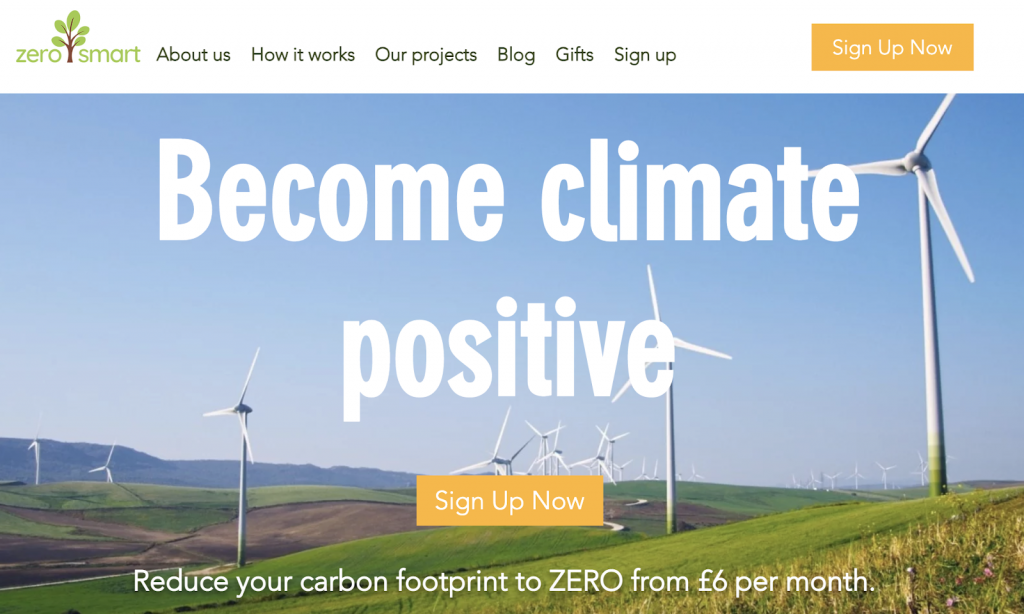
Zero Smart was founded in 2020 by Eliana Vanekova and John Munn as a way to make it easy for everyday people to support scientific climate solutions and to create systemic change for the good of all humanity. Today, they offer carbon offset subscriptions that support scientifically verified tree planting, energy efficiency, renewable energy, and landfill gas recovery carbon offset projects.
“Reduce your carbon footprint to ZERO from £6 per month”
Zero Smart
Carbon offset overview: Zero Smart offers carbon offset subscription plans for individuals, families, and businesses, as well as carbon offset gifts. They support the efficient cookstoves project in Eritrea, which empowers local women to build, install and maintain fuel-efficient cookstoves. The project reduces the demand for wood, improves air quality, and reduces carbon emissions.
Carbon offset effectiveness: Zero Smart’s efficient cookstoves project is verified and monitored by the Gold Standard. And all of their projects adhere to either the Verified Carbon Standard or Gold Standard to help ensure transparency and quality in the creation, quantification, and verification of offset projects. They have also partnered with the United Nations Framework Convention on Climate Change (UNFCCC) and Eden Reforestation Projects, which is included in our list of the Best Charities for Planting Trees.
Carbon offset costs: Their subscription plans cost approximately $5.37 per 1,000 kg of CO2 offset. And their carbon offset gift costs approximately $5.97 per 1,000 kg of CO2 offset.
How to get your carbon offsets: You can visit their website to get your energy-efficiency carbon offsets.
3Degrees: Making Climate Action Possible
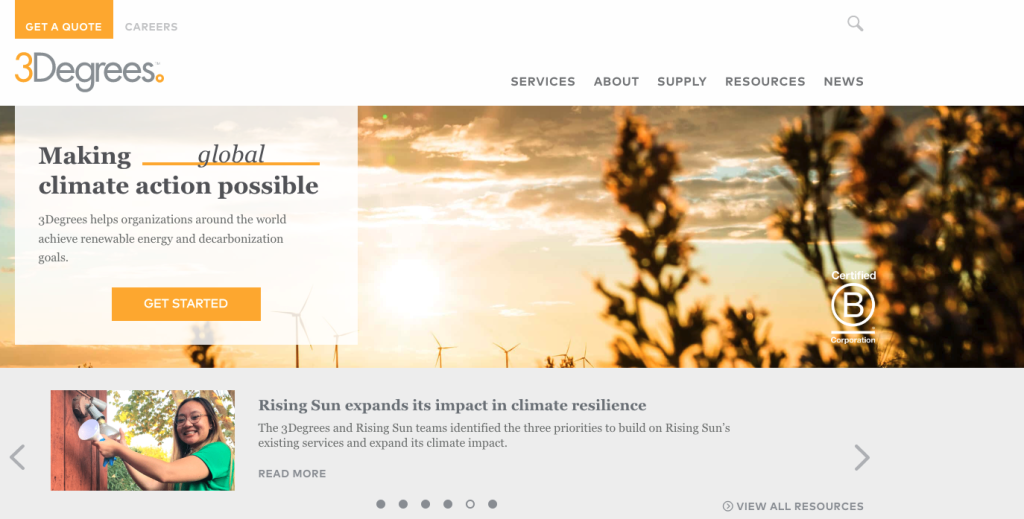
3Degrees was founded in 2007 by Steve McDougal and Dan Kalafatas to impact the renewable energy credit (REC), carbon offset, and green power industries. Today, they help organizations around the world achieve decarbonization and renewable energy goals via the use of carbon credits, RECs, renewable natural gas certificates, and climate consulting.
“Making climate action possible.”
3Degrees
Project overview: 3Degrees supports forest management, landfill gas capture, renewable energy, energy efficiency, and sulfur hexafluoride reduction offset projects. An example energy-efficiency project is the BioLite Improved Stove Programme in Uganda, which provides communities with ultra-clean burning fan-assisted wood stoves that reduce air pollution.
Carbon offset effectiveness: 3Degrees develops carbon offset projects that are third-party verified and adhere to one of the following global standards, Climate Action Reserve, American Carbon Registry, Verified Carbon Standard, or Gold Standard.
Carbon offset costs: Costs are determined after initial contact.
How to get your carbon offsets: You can visit 3Degrees’ website and contact a representative to get your energy-efficiency carbon offsets.
Co2nsensus: A Climate-Tech Company
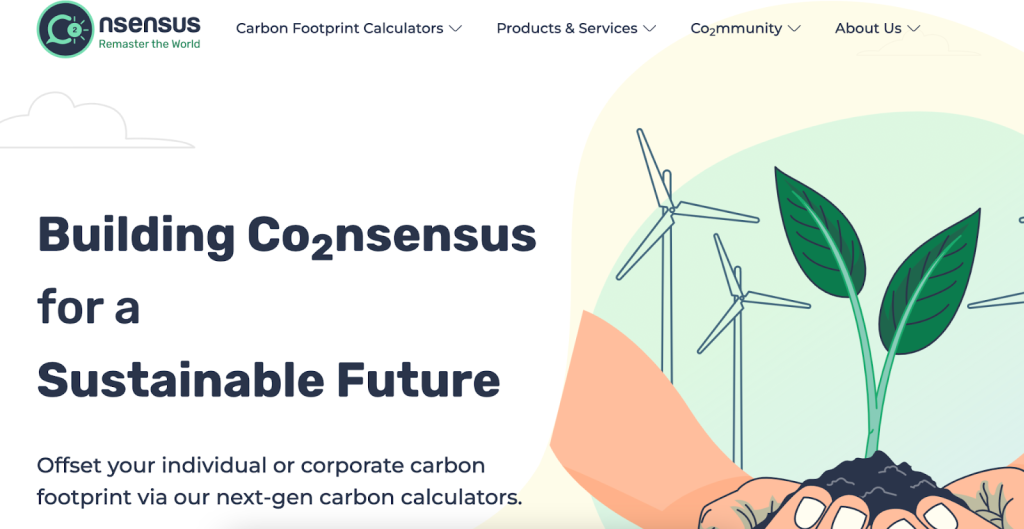
Co2nsensus was founded in 2019 by Bekir Cetin as a climate-tech company focused on helping individuals and businesses neutralize their carbon footprint. Today, they provide various carbon footprint calculators, carbon offsets for individuals, carbon management software, and a carbon-neutral e-delivery system for e-commerce.
“Building Co2nsensus for a Sustainable Future”
Co2nsensus
Project overview: Co2nsensus has a variety of personal carbon calculators that support carbon offset projects involving energy efficiency, reforestation, wind energy, landfill gas, biomass, and hydropower. Examples of energy-efficiency projects include Improved Cookstoves in Kenya, the Tuzla Geothermal Power Plant Project in Turkey, and the Gezin Solar Power Project in Turkey.
Carbon offset effectiveness: Co2nsensus’ carbon offset projects are certified by either the Gold Standard or Verified Carbon Standard and contribute to one or more of the UN Sustainable Development Goals.
Carbon offset costs: Pricing varies depending on the type of offset and project.
How to get your carbon offsets: You can visit their website to use their carbon footprint calculator and get your energy-efficiency carbon offsets.
How Effective and Efficient Are Energy-Efficiency Carbon Offsets
In terms of effectiveness, energy-efficiency carbon offsets help reduce deforestation and strengthen our natural carbon sinks, and bolster energy security to help transition away from fossil fuels. However, they can also lack additionality, and they do not reduce your own carbon emissions, which can lead to greenwashing.
In terms of efficiency, energy-efficiency carbon offsets avoid carbon emissions immediately, promote energy decentralization, and are relatively cost-effective. However, they can also lack standardization and monitoring.
Energy-efficiency carbon offsets are effective at mitigating climate change because they:
- Reduce the demand for wood fuels, thereby reducing deforestation and strengthening our natural carbon sinks
- Bolster energy security by providing reliable, affordable access to fuels and energy sources that emit less carbon than traditional fossil fuels
However, energy-efficiency carbon offsets can also lack effectiveness because they often lack additionality because many projects receiving revenue now would have been built regardless.
Energy-efficiency carbon offsets are efficient at reducing CO2 emissions because they:
- Avoid carbon emissions immediately after installation of the technology
- Promote energy decentralization, whereby power is generated at or near locations where it will be used
- Are relatively cost-effective when compared to other methods of carbon emission reduction
However, energy-efficiency carbon offsets can also lack efficiency because they often lack standardization and monitoring due to them being a decentralized solution.
Also, energy-efficiency carbon offsets do not reduce your own carbon emissions, which can lead to greenwashing. This occurs when emissions are only offset and not reduced from the source, and the consumer is deceived into thinking they are offsetting their emissions but in reality, they are not. This is why we should first reduce our emissions before relying on offsets.
What Are The 7 Pros and 3 Cons of Energy-Efficiency Carbon Offsets
Energy-efficiency carbon offsets avoid carbon emissions immediately, improve air quality, reduce deforestation and strengthen our natural carbon sinks, promote energy decentralization, bolster energy security and help transition away from fossil fuels, are relatively cost-effective, and allow us to reduce carbon emissions in ways we wouldn’t be able to accomplish individually.
Energy-efficiency carbon offsets can lack additionality, standardization, and monitoring, and they do not reduce your own carbon emissions which can lead to greenwashing.
What Are the 7 Pros of Energy-Efficiency Carbon Offsets
Energy-efficiency carbon offsets have various pros that make them effective at avoiding carbon emissions.
| 7 Pros of Energy-Efficiency Carbon Offsets | Quick Facts |
| #1: Energy-efficiency offsets avoid carbon emissions immediately | As soon as energy-efficient mechanisms are installed, switched on, or implemented, they begin reducing CO2 emissions because they use less energy to perform the same task as traditional methods. |
| #2: Energy-efficiency offsets improve air quality | Energy-efficient cooking, heating, and lighting mechanisms can reduce the amount of total air pollution, improving overall air quality and human health as a result. For example, energy-efficient cookstoves can help reduce fuel use by 30-60%, leading to less harmful emissions. |
| #3: Energy-efficiency offsets help reduce deforestation and strengthen our natural carbon sinks | Energy-efficient cookstoves and water filtration projects reduce the demand for wood, which in turn reduces the need to cut down trees. This is important in the fight against climate change because globally, forests act as a carbon sink capable of absorbing a net 7.6 billion tons (bt) of CO2 per year. |
| #4: Energy-efficiency offsets bolster energy security and help transition away from fossil fuels | Overall, energy-efficient mechanisms use less energy than traditional mechanisms to perform the same task. This reduces overall energy demand, which in turn reduces reliance on imports of biomass fuels or fossil fuels (e.g., coal, oil, and natural gas). Being able to produce your own energy without relying on other entities increases energy security, which is reliable, affordable access to fuels and energy sources. |
| #5: Energy-efficiency offsets promote energy decentralization | Energy-efficient practices promote energy decentralization, where power is generated at or near locations where it will be used. This decreases the need to transport energy and generates environmental benefits associated with a lower carbon footprint. |
| #6: Energy-efficiency offsets are relatively cost-effective | Energy-efficiency offsets from leading providers (e.g., Carbonfund, Ecologi, myclimate) cost less than $40 per ton of CO2 offset. Compare this to direct carbon capture offsets which can cost anywhere from $100-$1,200 per ton of CO2. |
| #7: Energy-efficiency offsets allow us to reduce carbon emissions in ways we wouldn’t be able to accomplish individually | Energy-efficiency carbon offsets allow us to reduce emissions from activities where sustainable alternatives are not yet widely available. |
What Are the 3 Cons of Energy-Efficiency Carbon Offsets
Understanding the drawbacks of energy-efficiency carbon offsets is important in order to effectively mitigate climate change.
| 3 Cons of Energy-Efficiency Carbon Offsets | Quick Facts |
| #1: Energy-efficiency offsets can lack additionality | Since 2020, global markets have contributed approximately $1 trillion towards energy efficiency-related practices involving buildings, transportation, infrastructure, and electric vehicles. The large demand for energy-efficient practices, in general, means that the infrastructure could have been built independently of energy-efficiency carbon offsets. |
| #2: Energy-efficiency offsets can lack standardization and monitoring | There are different standards for different types of energy-efficiency practices. Appliances, lighting, buildings, cooking, and fuels are held to different standards, making it difficult to standardize energy efficiency as one singular entity. |
| #3: Energy-efficiency offsets do not reduce your own carbon emissions, which can lead to greenwashing | If emissions are only offset and not reduced from the source, this could lead to greenwashing, when the consumer is deceived into thinking they are offsetting their emissions but in reality, they are not. |
How Can Energy-Efficiency Carbon Offsets Help Mitigate Climate Change
Climate change is a severe and long-term consequence of fossil fuel combustion. Energy-efficiency carbon offsets can help mitigate climate change because they eliminate fossil-fuel-derived carbon from our atmosphere which, if left untreated, can remain there for tens of thousands of years and exacerbate the negative effects of climate change.
How is Climate Change Defined
Climate change is arguably the most severe, long-term global impact of fossil fuel combustion. Every year, approximately 33 billion tons (bt) of CO2 are emitted from burning fossil fuels. The carbon found in fossil fuels reacts with oxygen in the air to produce CO2.
“Climate change: changes in the earth’s weather, including changes in temperature, wind patterns and rainfall, especially the increase in the temperature of the earth’s atmosphere that is caused by the increase of particular gasses, especially carbon dioxide.”
Oxford Dictionary
Atmospheric CO2 fuels climate change, which results in global warming. When CO2 and other air pollutants absorb sunlight and solar radiation in the atmosphere, it traps the heat and acts as an insulator for the planet. Since the Industrial Revolution, Earth’s temperature has risen a little more than 1 degree Celsius (C), or 2 degrees Fahrenheit (F). Between 1880-1980 the global temperature rose by 0.07C every 10 years. This rate has more than doubled since 1981, with a current global annual temperature rise of 0.18C, or 0.32F, for every 10 years.
As outlined in the 2015 Paris Climate Agreement, we must cut current GHG emissions by 50% by 2030 and reach net zero by 2050.
How Do Carbon Offsets Generally Help Mitigate Climate Change
Levels of carbon in our atmosphere that cause climate change have increased as a result of human emissions since the beginning of the Industrial Revolution in 1750. The global average concentration of carbon dioxide in the atmosphere today registers at over 400 parts per million. Carbon offsets can help prevent these levels from increasing even more.
When you hear the words “carbon offset”, think about the term “compensation”. Essentially, carbon offsets are reductions in GHG emissions that are used to compensate for emissions occurring elsewhere.
Carbon offsets that meet key criteria and verified project standards, are additional and permanent, and are part of projects that are carried out until the end of their lifespan have the best chance of reducing carbon emissions and therefore reducing climate change.
When we offset CO2 we also slow the rate of global temperature rise, which in turn minimizes the effects of climate change.
How Do Energy-Efficiency Carbon Offsets Specifically Help Mitigate Climate Change
Energy-efficiency offsets help eliminate CO2 emissions from direct fossil fuel combustion and from indirect electricity generation. By using energy-efficient appliances and methodologies, we reduce the amount of CO2 entering our atmosphere. And because higher levels of atmospheric carbon exacerbate global warming, less is better.
Final Thoughts
Carbonfund, DelAgua, South Pole, and Ecologi offer the best energy-efficiency carbon offsets. Myclimate and Clear offer many options for individuals and businesses looking to curb their carbon footprint. GoClimate, CarbonClick, and Wren support energy-efficiency projects through their carbon offset subscription services. And Native Energy, Cool Effect, Zero Smart, 3Degrees, and Co2nsensus offer a variety of energy-efficiency projects for both individuals and businesses.
Energy-efficiency practices avoid CO2 emissions by using less energy to perform tasks. This in turn reduces deforestation, increases air quality, and promotes energy security. But for all of the good carbon offsets can instigate, they should not be seen as the only solution to climate change. They are effective at reducing CO2 in the short term, but in the long term, avoiding carbon instead of directly reducing it fails to reduce CO2 enough.
When used in conjunction with direct CO2 reduction measures, carbon offsetting can be much more effective. We should reduce our own carbon footprint as much as possible first, and only then choose the most effective energy-efficiency carbon offsets.
Stay impactful,

Sources
- U.S. Environmental Protection Agency: Health, Energy Efficiency and Climate Change
- U.S. Environmental Protection Agency: Offsets and RECs -What’s the Difference?
- Britannica: Carbon Offset
- David Suzuki Foundation: Are carbon offsets the answer to climate-altering flights?
- US Department of Energy – Office of Energy Efficiency & Renewable Energy: Energy Efficiency
- Carbon Offset Guide: Energy Efficiency
- Impactful Ninja: What Are Energy-Efficiency Carbon Offsets and How Do They Work? The Big Picture
- Carbonfund: Homepage
- ClimeCo: Homepage
- Carbonfund: About Us
- Carbonfund: Our Energy Efficiency Projects
- Carbonfund: Kenya Burn Stoves Project
- Carbonfund: Aqua Clara Water Filtration Programme
- Carbonfund: South Korea Waste Energy Co-Generation Project
- Carbonfund: Truck Stop Electrification Project
- The Gold Standard: Homepage
- Verified Carbon Standard: Homepage
- American Carbon Registry: Homepage
- Carbonfund: For Individuals
- Carbonfund: Become a Small Business Partner
- Carbonfund: Become a Large Business Partner
- DelAgua: Homepage
- DelAgua: Project Rwanda
- DelAgua: Carbon Credits
- United Nations Convention Framework on Climate Change: The Paris Agreement
- United Nations Department of Economic and Social Affairs: The 17 Goals
- South Pole: Homepage
- South Pole: WWF Clean Cookstoves
- South Pole: Bamako Clean Cookstoves
- South Pole: Efficient Cookstoves
- South Pole: Climate Action Projects
- South Pole: South Pole has developed over 700 climate action projects
- Climate Action Reserve: Homepage
- South Pole: Contact the Team
- Ecologi: Homepage
- Ecologi: Your Plan
- Ecologi: Reforestation and Carbon Offset Projects
- Eden Reforestation Projects: Homepage
- One Tree Planted: Homepage
- Trees for the Future: Homepage
- Impactful Ninja: Best Charities for Reforestation
- Ecologi: Ecologi Public Impact and Operations Ledger
- Ecologi: Distributing cleaner cookstoves in Kenya
- Ecologi: High efficiency cookstoves in Tanzania
- Ecologi: Cleaner cookstoves in Zambia and Ghana
- Ecologi: Fuel efficient cookstoves in Honduras
- myclimate: Homepage
- myclimate: About myclimate
- myclimate: Flight Carbon Calculator
- myclimate: Car CO2 Emissions Calculator
- myclimate: Offset Your Cruise Carbon Footprint
- myclimate: Offset your event carbon footprint
- myclimate: Calculate your household emissions
- myclimate: Less Deforestation of the Rainforest due to Efficient Cook Stoves in Kenya
- myclimate: Better Life in Indigenous Villages in Bolivia due to Solar and Efficient Cook Stoves
- myclimate: Less Smoke Thanks to Efficient Cookers in Peru
- myclimate: Back to the Green Island with Efficient and Solar Stoves in Madagascar
- Plan Vivo: Homepage
- myclimate: Calculate your flight emissions
- myclimate: Climate Protection Subscription
- myclimate: Myclimate-CO2-Rechner
- myclimate: Donation for climate protection
- Clear: Homepage
- Clear: About Clear
- Clear: Carbon Offset Projects at Clear
- Clean Development Mechanism: CDM – Monitoring report for Efficient Cook Stove Programme
- Clean Development Mechanism: CDM – Improved Cook Stove Project 1, Nkhata Bay District, Malawi
- Quality Assurance Standards: Homepage
- Clear: Business Flights
- Clear: Offset My Flight
- GoClimate: Homepage
- GoClimate: About Us
- GoClimate: Clean-burning stoves in Kenya
- GoClimate: Our Climate Projects
- GoClimate: Calculate Your Carbon Footprint
- GoClimate: Book a meeting with our experienced climate advisors
- GoClimate: Contact
- CarbonClick: Homepage
- CarbonClick: Carbon Offset
- CarbonClick: About
- Wren: Homepage
- Wren: Calculate Your Carbon Footprint
- Wren: Our Projects
- Wren: Clean cooking fuel for refugees
- Native Energy: Homepage
- Native Energy: Mission & Values
- Native Energy: Madagascar Solar and Efficient Cookstoves
- Native Energy: Travel, Events, and Household Calculators
- Native Energy: Contact Us
- Cool Effect: Homepage
- Cool Effect: Our History
- Cool Effect: Buy Carbon Offsets For Air Travel
- Cool Effect: Scientifically Verified Carbon Projects
- Cool Effect: Breath of Fresh Air
- Zero Smart: Homepage
- Zero Smart: About Us
- Zero Smart: Our Projects
- Zero Smart: How it Works
- Zero Smart: Cookstoves in Eritrea
- Zero Smart: Sign Up
- Zero Smart: Reduce Your Carbon Footprint
- Zero Smart: Carbon Offset Gift
- 3Degrees: Homepage
- 3Degrees: Carbon Project Portfolio
- 3Degrees: BioLite Improved Stove Project Uganda
- 3Degrees: Contact Us
- Co2nsensus: Homepage
- Co2nsensus: About Us
- Co2nsensus: Carbon Offset Calculator | Flight Offset
- Co2nsensus: Buy Carbon Offsets
- Co2nsensus: Carbon Offset Projects
- Co2nsensus: Improved Cookstoves Offsets
- Co2nsensus: Tuzla Geothermal Power Plant
- Co2nsensus: Gezin Solar Power Project
- How Effective and Efficient Are Energy-Efficiency Carbon Offsets? Here Are the Facts
- National Geographic: Deforestation
- Clean Cooking Alliance: Climate, environment, and clean cooking
- International Energy Administration: Energy Security
- Vox: RECs, which put the “green” in green electricity, explained
- United States Environmental Protection Agency: Distributed Generation of Electricity and its Environmental Impacts
- Environmental and Energy Study Institute: Fact Sheet | Energy Efficiency Standards for Appliances, Lighting and Equipment (2017)
- Edie: Carbon offsetting – How are businesses avoiding greenwashing on the road to net-zero?
- Energy-Efficiency Carbon Offsets: All 7 Pros and 3 Cons Explained
- World Resources Institute: Forests Absorb Twice As Much Carbon As They Emit Each Year
- Impactful Ninja: What is the Carbon Footprint of Fossil Fuels?
- Impactful Ninja: Why is a Carbon Footprint Bad for the Environment
- Impactful Ninja: 10 Best Direct Carbon/Air Capture Offsets
- World Nuclear Association: Carbon Emissions from Electricity
- Natural Resources Defense Council: Global Warming 101
- myclimate: What does “net zero emissions” mean?
- United Nations Convention Framework on Climate Change: The Paris Agreement
- National Oceanic and Atmospheric Administration: Climate Change – Atmospheric Carbon Dioxide
- Natural Resources Defense Council: Carbon Offsets 101
- Terrapass: Carbon Offset Projects
- Carbon Offset Guide: Additionality
- Carbon Offset Guide: Permanence




